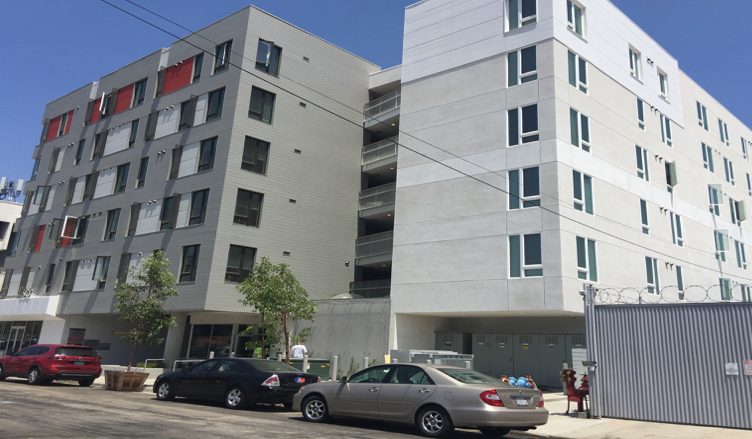HOUSING THE UNHOUSED-On July 14, 2020, PATH Metro Villas Phase II (PATH II) was ready for occupancy and hit the ground running to serve those experiencing homelessness.
Two and a half years prior, on December 2017, the second HHH Loan for $3.5 million was awarded to PATH Ventures and on same month broke ground for new construction at 320 North Madison Avenue in Los Angeles, Council District 13.
The million-dollar award was supplemented by other permanent funding sources for the total (initial) estimated development cost of $54.2 million, according to Staff Report for FY 2017-18 Recommended Projects.
The funding sources are: Affordable Housing and Sustainable Communities program (AHSC) funded $12.4 million; Veterans Homeless Housing Program (VHHP) funded $6.1 million; Mental Health Service Act funded $1.5 million, HCIDLA-HOME Loan funded $4.2 million, and 4% Tax Credit Equity was $4.2 million, etc.
In contrast, per Proposition HHH Quarterly Report of June 2020, Attachment A, the estimated total development cost increased from $54.2 million to $56.0 million with per unit cost of $459.5 thousand dollars, and the total HHH Loan amount expended to date decreased to from $3.5 to $3.1 million.
According to the LA City HHH PSH Program 2018-Regulations,
- Eligible projects are developments that serve extremely and very low-income, chronically homeless special needs individuals and veterans, homeless families, homeless transition-aged youth (TAY), homeless seniors, homeless disabled and homeless frequent users of Los Angles County services.
- The interest rates for all loans are three percent (3%) simple interest, and HCIDLA reserves the right to negotiate a higher or lower interest rate if it is found to be beneficial to the project.
- The terms of affordability is fifty-five (55) years from the completion of construction, and it remains in effect for no less than the agreed-upon term regardless of the date upon which the HCIDLA loan is fully repaid.
In a live interview on August 9, Kelly Kim, Case Manager at PATH II, summarized the occupancy procedure for the brand-new development sites comprised of 122 units (studios and one-bedrooms).
Ms. Kim shared that 90 PSH units are for homeless families and veterans that include the chronic homeless. To be specific there are 47 units for the chronic homeless, per HHH Project Expenditure Plan 2017-18.
“We took in a few married couples, a few single parents with a child, and three clients who had been homeless for 40 years,” Ms. Kim said. In addition, to fill[ing] the 30 affordable housing units, we had a lottery with 2,000 applicants.”
The Housing Authority of the City of Los Angeles (HACLA) and Department of Health Services (DHS) provide rental subsidies (vouchers) for PSH projects. Also, HACLA administers both Veterans Affairs Supportive Housing (VASH) vouchers for veterans. “That’s how we get our matches, we are left only with two (VASH) units,” Ms. Kim said. “HACLA would do inspections for cleanliness and check that only the persons on the lease are the sole residents.”
PATH II amenities include subterranean parking, a health clinic, mental health clinic, several community rooms, 9 washing machines and dryers, per HHH Staff Reports FY 2017-18 Recommended Projects (Item 4).
Ms. Kim confirmed there will be a clinic on site. Meanwhile, clients are connected to outside resources when necessary. “We provide independent living; we do not have a cafeteria or cook for them; each unit has its own kitchen and clients buy their own food. We help them apply for General Relief or Social Security to have income. Everything is individually based,” she said.
Due to COVID-19 restrictions, tenants do not meet in big groups. “When it’s safe to do so, for those who choose to participate, we’ll meet for morning coffee and donuts to chat and get to know each other. Also, we’ll offer more focused groups such as conflict resolution or 12-step,” said Ms. Kim.
“Our primary job is to keep tenants stay housed with a focus on harm reduction, and if drug addicted, we offer help to bring them out of addiction by providing medication management or mental health assistance aside from their only requirement to meet with case management.”
(Connie Acosta is co-chair of the Planning and Land Use Committee of the Echo Park Neighborhood Council.) Prepped for CityWatch by Linda Abrams.













